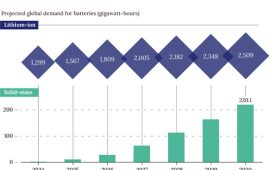Pune: Picturise a roadside stall where sugarcane juice is served to its customers! The first thing that comes to mind is the place may attract flies, ants and insects because of its high sugar content; bagasse (crushed sugarcane sticks) dumped in a small bag or container and a block of ice wrapped in a cloth or kept in an open box. These unhygienic surroundings and unclean, unsafe, or unhealthy ice, glass and other products used by the stall owner would deter customers, howsoever motivated to prefer a healthy drink over carbonated drinks.
One of the biggest challenges in improving this business is that it was never organised. Kirty and Milind Datar, co-founders of the deep-tech startup CaneBOT (Canectar Foods Pvt Ltd), took up this challenge and have developed a patented food-robotics solution offering fresh and hygienic sugarcane juice. A contact-less and all-digital solution, CaneBOT is an autonomous smart kiosk that enables 24×7 availability of freshly crushed sugarcane juice at convenient locations.
Redefining the journey of sugarcane from farm-to-glass, positively impacting the social and economic fabric of rural farmers, health of urban consumers and the country’s economy at large, Kirty and Milind wish to revive the dying culture of drinking sugarcane juice in India and have made it their mission to make sugarcane juice a lifestyle beverage in India.
Entrepreneurship call
After a 13-year stint in a reputed IT company, both Kirty and Milind, who were at the peak of their career, resigned one fine day in 2012. Those days, startups were not a buzz word, and the couple did not have any family business background.
Kirty said, “While exploring several business options, Milind and I always thought that, although being a part of our culture, the new generation or the urbanised population has stopped drinking sugarcane juice. We used to discuss about this in our office, and always felt that though this business has a lot of potential, it was not organised and not given enough attention. We decided to take it up as a project and when we got enough conviction, we resigned together in 2012.”
Milind said, “Our putting down papers together was a step towards not getting into the trap of getting back in the job if our business struggles. Also, we both have complementary skills and competencies. We gave ourselves two years and succeeded. Since we were creating a new category in market back in those days, it was a struggle for us, but our business model worked. The initial concept was of having semiautomatic kiosks or outlets in IT companies in Hinjewadi and Talegaon areas. We were using chiller to refrigerate sugarcane sticks and ecofriendly paper cups to serve the juice. We did not use ice, water, or preservatives to add to the juice.”
“Since, I come from HR background, I had contacts in several companies, but none were ready to have sugarcane juice outlet inside their campus due to hygiene-related fears. So, we set up a store in Sinchannagar and invited them where they could witness that the sugarcane stall was hygienic with no houseflies around. That helped us build confidence and got our first contract with a company in Hinjewadi. Within six months, we had eight outlets in Hinjewadi IT Park,” Milind said.
Sourcing
Explaining the sugarcane sourcing process, Kirty said, “We approached the Indian Council of Agricultural Research (ICAR) – Sugarcane Breeding Institute in Coimbatore for our initial research and to understand varieties of sugarcane, brix levels and what is the prescribed consumption levels for a healthy individual. We went around 100 villages in Maharashtra since we have surplus availability of sugarcane in our state. We selected farmers to provide us year-long supply of cane.”
“We paid premium price to farmers to ensure quality and sorting process. IT companies’ operations are like a five-star hotel, and they have regular audits, hygiene, and quality checks. We had based our practices on these parameters and defined our raw material process accordingly. One of us would be at the farm for two months when we started. Then we set up a team of trained personnel to reject the cane sticks that fail our standards. Our employees at outlets were also trained and paid well as per market standards. Despite initial hardships, the process itself has become our strength. We believe that any brand is built on trust and that requires no compromise in quality. That is the reason we had regular and loyal customers for next six years and companies renewed annual contracts,” Kirty said.
Scalability
Till January 2020, CaneBOT had sold around 30 lakh glasses of 250 ml each. Meanwhile, technology evolved and the duo was preparing for scaling up their business.
Milind said, “IT professionals were happy and chose sugarcane juice over other carbonated or packaged drink. Sugarcane farmers also benefited and environmentally too it was sustainable. The crushing machines used by us were single crush machines and we never reused the bagasse after it was crushed the first time. Even the flavours used with regular juice, like lemon and ginger, were also lab-tested and reports were submitted to companies.”
“Before the Covid-19 pandemic struck, we had applied and got selected for an entrepreneurship programme of IIM Bangalore. We were doing a revenue of ₹2 crore then. After studying business case studies from around the world, we realised that we need to pivot our business model to scale business. Our earlier business model required minimum 100 square feet of space for the outlet and three operators daily. If we scaled up through that model, then rentals, salary and other operational expenses would also go out of hand and the pricing of one glass of sugarcane juice would become exorbitant. We also gave a thought for diversifying product offering range to increase revenue, but realised that it would still be a flawed model from scalability perspective,” he said.
Covid-19 impact
CaneBOT won the Business Growth Plan (BGP) contest at IIM Bangalore and were planning for rapid expansion in February 2020, just before the Covid-19 pandemic hit the globe. With lockdowns being introduced, IT companies shut down their operations and asked employees to work from home. CaneBOT revenues went down to zero overnight and reviving this business was a challenge.
Kirty said, “We took it as an adversity, turning into an opportunity to create a scalable model. Since everything was shut, we had enough time to think on alternatives. We considered tea or coffee vending machines and began researching from the automatic dispensing perspective. It was not easy because automation requires uniformity on input and output side and sugarcane being a natural product had inherent bends, nodes, etc. We took around 15 months to come up with a frugal prototype just to check the feasibility of crushing sugarcane sticks. Meanwhile, we also realised that we had to be present in the market and hence we launched packaged sugarcane juice as a small-time project. We did structured marketing, branding, selling and CaneBOT as a brand name stayed alive during the second wave of pandemic induced lockdowns too. We also applied for a patent for the automated machine and it was granted.”
Reality show
The decision of selling packaged sugarcane juice helped Kirty and Milind to garner some profit during the lockdown. Since they were a revenue-making company, they got selected for participation in a reality show after applying for it.
Kirty recalls, “Although we did not receive any funding, we got genuine feedback from the investor panel. They had advised us not to mix up the B2B and B2C business model and we later thought on this and decided to shut down our B2C packaged drinks business. It saved us a few lakh rupees and two years of time. It also meant that once again our revenues would go down to zero as our machine prototype was far from completion.”
Cyber-physical Milind said, “For the next phase of machine development, ₹60 lakh was needed. We started looking for government grants and got ₹70 lakh for machine development, including the BIRAC (Biotechnology Industry Research Assistance Council) grant through IIT Bombay and National Chemical Laboratory (NCL)-Venture Centre. Technical evaluation done by IIT Bombay and Venture Centre helped us in getting validated and adopt scientific approach to define hygiene standards too. We got good manufacturing partners too and while the machine got ready, we got incubated at Venture Centre in Pashan.”
Kirty said, “Vending machines are not new to any of us, but most of them are for just dispensing products. The fully automatic CaneBOT machine processes the sugarcane sticks, crushes them, and then dispenses the juice using various sensors. This comes under robotics and deep-tech category.”
“We are ahead of the Internet of Things (IoT). The CaneBOT is a cyber-physical system, in which the hardware is controlled through a software or algorithm written by us. This innovative approach got us selected for the Samridhi Conclave organised by IIT Ropar recently to pitch in front of investors and government agencies. IIT Ropar had shortlisted only 12 deep-tech startups from about 300 cyber-physical companies and 3,000 such startups across India. Qualcomm also selected us in their eight shortlisted startups as we are using their controller board,” said Kirty.
Milind said, “CaneBOT has an auto-cleaning mechanism, meaning it has programmatically scheduled cleaning after every two hours or after every 50 cups of juice being sold. If the machine is low on sugarcane stick stock, a notification will be sent to the command centre and an employee or franchise operator can refill the stock within time. It is a smart machine with lot of sensors installed within and hence the initial manufacturing cost would be high. But, with economies of scale, the machine cost will be reduced to ₹5 lakh.”
Beta launch
Kirty and Milind have carried out the beta launch for the prototype machines at F Residences society in Baner. “We have conducted trials on the factory-made machines and brought them in customer environment. Society members, including children and senior citizens, were able to manoeuvre and access the UI (user interface) easily. We were observing every transaction and noticed some hardware issues. The machine is now getting improvised for commercial launch,” said Milind.
Go-to-market strategy
After patent approval, CaneBOT is ready for a commercial market launch. Kirty and Milind are now on a lookout for more funding for launching five machines on commercial basis. Confirming a latest fundraise, Kirty said, “IIT Ropar has approved ₹43 lakh funding and some private investors are willing to match this amount. Venture Centre has also affirmatively responded for financial assistance under NIDHI Seed Support System programme and the due diligence is in process.”
“The first 15 machines will be owned and operated by our company. Thereafter, we will go with a franchise model. We are targeting a launch in November 2023 with around 25 machines in Pune within a year and 100 machines in Mumbai by 2024-end. The expansion will be rapid as we now need only 15 square feet space for a single machine, hence it is feasible rent-wise, and we already have the supply chain setup ready,” Milind said.
Kirty said, “We will also have institutional set-up in companies, malls, multiplexes, metro stations, hospitals, colleges, large housing societies, airports, etc to make it available to masses 24×7. With cricketer-turned-journalist Sunandan Lele as CaneBOT’s mentor and advisor, the startup has been invited by the Karnataka State Cricket Association (KSCA) for installing CaneBOT machines at Bengaluru’s Chinnaswamy Stadium for ICC World Cup 2023.”
Creating microentrepreneurs
While appointing franchise, Milind and Kirty have plans for women, physically challenged, war widows and youth from the marginalised sections of the society. Milind and Kirty wish to make sugarcane juice a lifestyle beverage and national drink of India. The duo states, “We have plans to locally source sugarcane sticks to benefit their economy. Local farmers will find new market avenues and it will positively impact their incomes. The bagasse will also be processed for conversion to green biofuel.”
“CaneBOT is contemplating a collaborative tie-up with Bhashini app for integrating audio command or instructions for robotic machines. With this app, any user can give commands, which will be translated by the app, interpreted by the machine software, and respond in the preferred language of the user. The Bhashini app integration will support 17 languages and blind people can also easily use the machine,” they claim.











